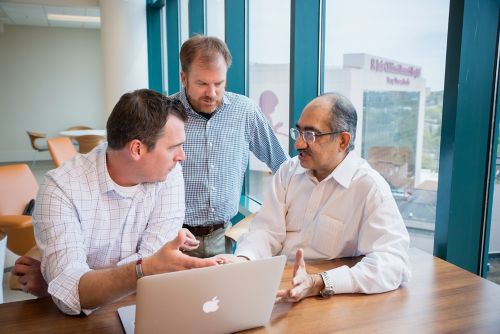St. Jude Family of Websites
Explore our cutting edge research, world-class patient care, career opportunities and more.
St. Jude Children's Research Hospital Home

- Fundraising
St. Jude Family of Websites
Explore our cutting edge research, world-class patient care, career opportunities and more.
St. Jude Children's Research Hospital Home

- Fundraising
Over the past six decades, through seminal contributions to research and care for pediatric brain tumors, St. Jude has built a legacy of excellence in neuro-oncology.
Now, as the institution works to advance that legacy, new leadership takes the reigns to continue innovative research and care for children and young adults with brain tumors.
Giles Robinson, MD, Department of Oncology, understands that legacy of excellence. In 2023, Robinson was appointed the Director of the Division of Neuro-Oncology within the Department of Oncology. Robinson takes on this role after Amar Gajjar, MD, Department of Pediatric Medicine chair, who led the division for two decades.
Over the past 16 years, Robinson has led research and clinical efforts that have increased the survival of children with brain tumors, making him an internationally recognized expert in pediatric neuro-oncology. At the core of his work is a belief that therapy can be improved through an increased understanding of genomics. This approach shapes his clinical research, including the clinical trials he leads.
Under Robinson’s leadership, clinical research for pediatric brain tumors takes a targeted, molecular approach. SJiMB21 is the first clinical trial to tailor molecular therapies for infants with medulloblastoma by using a tumor’s molecular makeup as a therapeutic guide, and clinical trial SJ901 assesses targeted treatments for children with low-grade gliomas.
Robinson’s simultaneous appointment as co-leader of the Neurobiology and Brain Tumor Program within the St. Jude Comprehensive Cancer Center, a title he shares with Suzanne Baker, PhD, Department of Developmental Neurobiology, ensures that he steers both clinical and research efforts in neuro-oncology across major initiatives and departments at St. Jude.

Paul Northcott, PhD; Giles Robinson, MD; and Amar Gajjar, MD, discuss how intersections between science and clinical care can advance treatment opportunities for rare pediatric brain tumors.
“Our team will continue its mission of improving survival and reducing treatment-related toxicities for children with brain tumors by developing effective therapies through a better understanding of the disease,” said Robinson. Situated at the helm of these two units, he now leads one of the largest clinical brain tumor programs in North America.
To unite major initiatives among research programs and departments across St. Jude, the institution has recently established resource hubs, known as Centers of Excellence. These Centers are designed to advance science in each focus area by facilitating cross-laboratory collaborations via shared physical space and ease of access to technology and expertise.
To further advance the basic science foundation of neuro-oncology research, St. Jude recently launched the Center of Excellence in Neuro-Oncology Sciences (CENOS). Led by Paul Northcott, PhD, Department of Developmental Neurobiology, CENOS will apply bold, innovative strategies to advance disease understanding, enhance treatment, and improve outcomes for children with malignant brain tumors.
Northcott has contributed significant, impactful discoveries, including the original description of molecularly and clinically distinct subgroups of medulloblastoma and their developmental origins. He is prepared to lead a bold research program to address fundamental questions shaping the field of pediatric neuro-oncology
“This Center of Excellence is living up to the spirit of excellence across the St. Jude campus,” said Northcott. “We are doing transformative research that further solidifies our presence in the pediatric neuro-oncology community for making discoveries and driving change to ultimately impact patient care.”